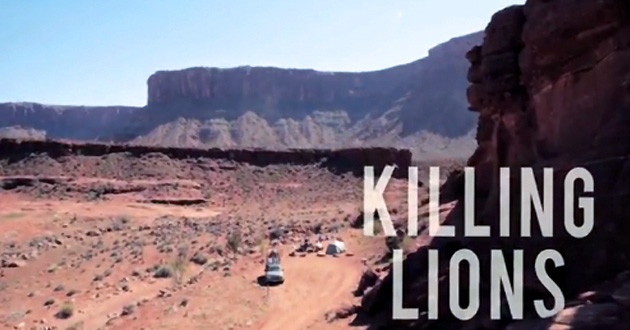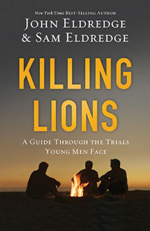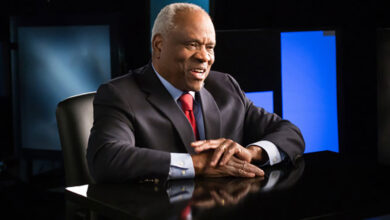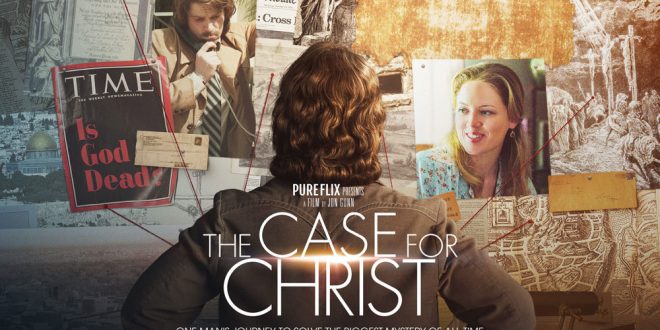Best-selling Christian author talks about the advice every millennial needs to hear

John Eldredge served for 12 years on the staff of Focus on the Family before releasing a book that became a publishing phenomenon, Wild at Heart. That 2001 book has now sold nearly 5,000,000 copies. His latest book is Killing Lions, a guide to young men that he co-wrote with his son, Sam. We had this conversation in the studio of Ransomed Heart Ministries, the ministry Eldredge leads in Colorado Springs, Colo.
How Killing Lions get started?
This is a book for younger men. My son, Sam, is an English major, graduated, wanted to be a writer. About a year out of college, we started these Wednesday night phone calls because he was in the deep end of the pool and taking on water—work and money versus following your dreams and your passions. Then entered a girl and understanding and working through love, romance, the feminine heart, decision-making, faith in God, bringing justice to the world, all those things that millennials care about and are asking questions about.
We got about three months into those phone calls, and I asked, Sam, [do] your friends, guys you hang with, have anybody that they can talk to about this stuff? He didn’t even pause. It wasn’t a beat. He said, oh, none. I don’t know anyone. These are good kids, by the way. It was a Christian college alumni crowd. I said, Sam, if we put this down on paper, I think we’d have a lot of young men. … So that’s how this book was born.
 Explain the central metaphor of the book, killing lions. Where did that come from?
Explain the central metaphor of the book, killing lions. Where did that come from?
In ancient African cultures a young man was not considered a full member of the tribe, an elder, a man. He couldn’t marry and he couldn’t own land until he had killed a lion. It was symbolic. It was a rite of passage that demonstrated courage in the face of adversity. We took that metaphor of killing lions and we applied it to what life is like in young adulthood, especially for young men needing to develop a sense of courage, a sense of self in the face of adversity.
Would you mind reading a bit of Killing Lions? I should explain that in the first sentence of the passage I want you to read you refer to a book called The Alchemist, a book both you and Sam admire.
I’d be happy to. “One of the essential messages of The Alchemist or The Hobbit, The Aeneid, any of the great stories, is this. Do not give way to despair. Do not lose heart. This battle toward a life worth living is far more art than science. It is the art of a warrior. I was watching a remarkable documentary on the hunters in southern Kenya. Their bows simply aren’t strong enough to bring down big game, so they steal the kill off lions. In a stunning display of courage and cunning, they walk right up to a pride devouring a wildebeest. Their unwavering confidence causes the lions to run off. In the next scene, the men are roasting wildebeest flank over an open fire, talking and laughing. One of them says that not everybody fights lions. Some people are cowards. That is the campfire you want to be at, the feast of the daring.”
The campfire of the daring, that’s the campfire you want to be at.
Exactly. Why do men love that? You get guys around a campfire and they start telling their stories. That’s the fellowship that they want to be in. From boyhood, every man has a core question and the question is, do I have what it takes? That’s why you see young men riding their motorcycles fast and jumping off bridges into rivers and skiing double black diamonds and all the crazy things young guys do. That’s not just craziness. That’s not just adventure. They’re trying to answer the question, do I have what it takes? What we’re trying to do is give that focus and direction. Let’s hook that up to a bigger story, more than having a great snowboard season. Yes, daring. Yes, courage, but applied to a life worth living.
A part of your story is the story of Wild at Heart, which became a publishing phenomenon. You said 3 to 5 million copies of Wild at Heart sold. In Killing Lions, you talk about the sense of anxiety that you felt after subsequent projects didn’t perform as well.
Wild at Heart created a set of expectations maybe, partly, on my part, certainly on my publisher’s part, but also in the world out there, that my next books would be as remarkable. But, as you said, Wild at Heart was a phenomenon. It was and remains to be a message for a moment in time. It spoke to a vacuum of masculinity in Christendom that needed addressing. It was difficult because I love my other books, and I think they are, in some ways, just as important. I’m the author, so of course I’d think that. It was Jay Leno who was remarking that if he did a really great show, he actually was depressed afterwards because he knew he’d have to do it again the next time and the next time. So, yes, there were some things that I had to sort through and get my bearings straight.
How did you do that?
This was the beauty of having a relationship with God. We have a Father, and He cares about our internal world—issues of motive, issues of fear, issues of validation. It was a beautiful exchange with the Father of, will you be content with the good work that you’re doing in the world without it having to be fabulous? Are you content with good over fabulous? I had to step back and go, of course I am. My goodness, thank you for what I get to do. To reach people’s lives, to help them, to drive them closer to God, to bring the redemption of Christ into people’s lives is a tremendous honor. I had to get out of the success thing, that whole whirlpool of money and glamour and books and being a name.
Isn’t that part of the pathology of the evangelical church? We worship success. We celebrate the mega-churches, and we don’t so much celebrate the pastor who has been faithful for 30 years in a church with 250 people. What does that say about us?
The seduction of the world is the very thing that you’re describing. It is surrendering your value system to a different value system, one of fame, performance, numbers. How’s your book doing? How’s your church doing? How many people are listening to your podcast? It is absolutely soul-killing, and here’s why. In order to offer life, you have to have a life. This was the secret of Jesus in all those passages where they went looking for Jesus and they couldn’t find Him because He was out on the mountain alone. He does the strangest things. Right when the momentum is going in a certain location, He moved. Jesus was able to maintain an intimacy with God, his Father, that allowed Him to be the person that He was in the world. When He was successful and when they hated Him, He was the same guy, the exact same character in both scenarios. We have exchanged our value system for the world’s numbers, success, glitz, glamour. I was heartbroken when I was talking to a worship leader recently who is a little bit of a has-been. His music is great, and it brings me in to worship. I was asking him, what happened? He says, if you want to be a successful worship leader these days, you have to have sex appeal. You’ve got to be young, and you’ve got to be good looking. I just shuddered and thought, oh, my, we’ve exchanged the value system of the kingdom of God for the value system of Wall Street.
If I could play devil’s advocate for a moment, a lot of guys are going to say, that’s easy for John Eldredge to say. He’s had his million seller. How do the rest of us who have not had that kind of validation from the marketplace come to that same place?
I love a quote of George McDonald, where he says, “Without Christ mankind must fail miserably or succeed even more miserably.” When Paul talks about learning the secret of contentment, I don’t think people understand that learning to handle success is far more costly. It’s a very, very difficult thing to navigate that world. For all of us, the secret of contentment is that our identity and our value are grounded in the love of God. If you put them in anything else, you put a pressure on another person to come through for you, and when that falls apart, who does that leave you as? What’s your identity now? When you put it on the success of your church … what happens in the low seasons to your identity and your sense of being loved? We have to anchor that in the love of God. All of us do.
One of the things that you said to Sam in the book was that we should pray that God would give us validation. What do you mean by that?
Every little boy is asking one question: Do I have what it takes? When they ride their bikes with no hands, when they’re doing the flip on the trampoline, they want dad there to see that. Every little girl is asking one question, and it’s a little bit different. It’s do you delight in me? Do you see me? They both look to the father, by the way. Gender identity is bestowed by the father. Psychologists have shown that in multiple studies.
Knowing that about us as human beings, here’s the moment. The baptism of Christ. He goes down into the Jordan, He comes up, and God the Father speaks. It’s one of the few moments in all of scripture that God speaks audibly so the entire crowd can hear. He says two things. He says I love you and I’m proud of you. That validation—who you are as a person—even Jesus of Nazareth needed to hear that, and He needed to hear it from His Father.
This search for validation—oh, my goodness, this explains every man’s life. You want to know how he’s wired? You want to know why he does the things he does and why he doesn’t do things? How come he doesn’t come down and play basketball with us at the Y? Why is he always over at the office? It’s because he’s found validation in one place, and he’s avoiding exposure everywhere else. Everything we do is around this search for validation, particularly as men.
In Killing Lions, what Sam and I are talking about is how to get a grounded sense of identity in validation from God. You can ask your Father for validation, and He will bring it to you. He’ll bring it to you through people, hopefully your earthly father, but if not there, others who love you, mentors, coaches, teachers, pastors. He’ll also bring it directly to you through His love. A person who is grounded in that kind of validation can navigate the shipwreck of the world without really being affected by it.
If you could summarize the advice that you give in Killing Lions, what would that be?
Let’s take the pressure off the 20s. The book is primarily speaking to young adults, and young adult men, in particular. We’ve done something very unfair to young men. We send them off to college or perhaps military or maybe a trade school, and then we just toss them into life and we say, “Good luck.” We expect wisdom and an adulthood of them in their 20s that’s simply not fair to expect.
What we do in Killing Lions is take the pressure off. It is a decade of exploration and transformation. It’s primarily about learning who you are, what you love, what your place in the world might be, and letting God shape your character so that when your dreams do come true, you’re the kind of person who can handle it. God is far more concerned about who we are becoming than what we achieve. Those months and years spent working at Starbucks even though you’re an MBA, that’s not wasted time. I met a young kid, bright kid, the other night who helped me at Barnes and Noble find a book I was looking for. He was an architecture grad. What’s he doing at Barnes and Noble? That’s not wasted time. For a young man, those are good hours. The perseverance, hard work, dealing with difficult people—that’s shaping you to handle the life that’s coming.
One of the reasons that you have to say that, though, is because young people today do have a certain sense of entitlement in part because they’ve been poorly served by our generation, right?
We did this generation a great disservice. Theirs is the generation of the self-esteem movement. Every kid got a trophy. We were so afraid of messing it up as parents that we overindulged the generation. We were so concerned about their self-esteem that we didn’t really focus on their work ethic, so it built into them a sense of entitlement. Here’s the problem with that: It starts to look true because they’re watching buddies of theirs invent an app for the smart phone. They’re making millions, and these kids are 23, so they think it can be done. There is this sense of entitlement, the sense of unrealistic expectation, that I think has happened both because of the way they were parented but also because a few of them do come up with a software program. …
And those few are the ones that we celebrate, right? We have become so enamored with this celebrity ethic that we take the one in a million or the one in 10 million and we try to make everybody believe that that can be them.
Exactly. … The virtues of good work and meaningful neighborhood connections, establishing community, helping people with their problems, is a very rewarding life, and that’s what we haven’t told this generation. We’ve said, instead, the only rewarding life is if you have a megachurch. That’s crushing to all of the young pastors out there who aren’t going to have a megachurch, but who could have a very rewarding life being involved in a smaller church in a community making a difference in people’s lives. There is a rewarding life that has nothing to do with celebrity.
— by Warren Cole Smith | WNS




